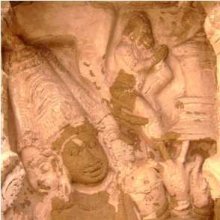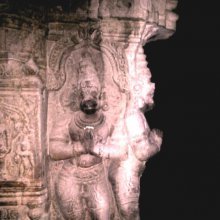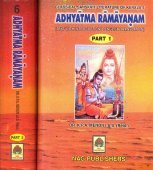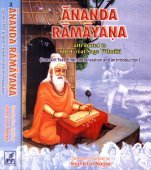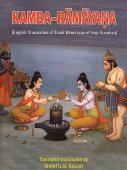Vali, Vālī, Vāli: 27 definitions
Introduction:
Vali means something in Hinduism, Sanskrit, Buddhism, Pali, the history of ancient India, Marathi, Jainism, Prakrit, Hindi, biology, Tamil. If you want to know the exact meaning, history, etymology or English translation of this term then check out the descriptions on this page. Add your comment or reference to a book if you want to contribute to this summary article.
Vali has 27 English definitions available.
Images (photo gallery)
(+9 more images available)
Languages of India and abroad
Sanskrit dictionary
[Deutsch Wörterbuch]
Source: Cologne Digital Sanskrit Dictionaries: Böhtlingk and Roth Grosses Petersburger WörterbuchVali (वलि):—(von val) f. [Śāntanācārya’s Phiṭsūtrāṇi.2,2,] Comm. [Siddhāntakaumudī 248,a,3] und valī .
1) f. (ringsum laufende) Falte der Haut (bei Menschen und Thieren), Runzel [Amarakoṣa 3, 4, 26, 197.] [Trikāṇḍaśeṣa 3, 3, 401.] [Hemacandra’s Anekārthasaṃgraha 2, 501.] [Medinīkoṣa 1. 35. fg.] [Vaijayantī] bei [Mallinātha] zu [Śiśupālavadha 3, 53.] [Manu’s Gesetzbuch 6, 2 (=] [Mahābhārata 12, 8887).] jarā valī ca māṃ tāta palitāni ca paryaguḥ [Mahābhārata 1, 3467. 3492.] valīsaṃgatagātra [3471.] valīmaṇḍitatanu [Spr. 779.] valibhirmukhamākrāntam [1948.] gātreṣu valayaḥ prāptāḥ [4011.] [Bhāgavatapurāṇa 5, 24, 13. 9, 3, 14. 6, 42.] [Suśruta 1, 62, 4. 129, 8.] vaktraṃ valibhirvimuktam [?2, 152, 16. 236, 8. am Augenlid 338, 1.] arma yatra valījātam [334, 14.] Falte im After [1, 258, 11. 260, 5. 6.] [Śārṅgadhara SAṂH. 1, 6, 5. 2, 9, 24.] valitraya (vgl. tribalī) [Kumārasaṃbhava 1, 39.] [Kathāsaritsāgara 84, 7.] [Spr. 2878. 3728.] [Mahābhārata 4, 394.] [Kumārasaṃbhava 5, 24.] [Kathāsaritsāgara 90, 45.] [Bhāgavatapurāṇa 1, 19, 27. 4, 21, 16. 24, 50.] [Varāhamihira’s Bṛhajjātaka S. 51, 8. 61, 15. 68, 22. 24.] kakṣāvalayaḥ (beim Elephanten) [67, 2.] valayo bhrataraṃgābhāḥ (so die neuere Ausg.) [Harivaṃśa 4298.] jaṅghāvali [Pāṇini’s acht Bücher 6, 3, 12, Scholiast] Falte an einem Horn: tri, pañca [Kātyāyana’s Śrautasūtrāṇi 7, 3, 29.] in einem Betttuche [Sāhityadarpana 42, 11.] —
2) bali m. Griff eines Fliegenwedels [Hemacandra’s Anekārthasaṃgraha] [Medinīkoṣa] [Hārāvalī 265.] [Meghadūta 36.] —
3) m. Giebelbalken [Trikāṇḍaśeṣa] [Hemacandra’s Anekārthasaṃgraha] [Medinīkoṣa] valī f. [Vaijayantī] —
4) f. valī Welle [Vaijayantī] —
5) vali Schwefel [Hemacandra’s Anekārthasaṃgraha] —
6) vali ein best. musikalisches Instrument [Hemacandra’s Abhidhānacintāmaṇi 85.] —
7) valī [Kathāsaritsāgara 123, 61] fehlerhaft für vallī .
--- OR ---
Valī (वली):—s. u. vali .
--- OR ---
Vāli (वालि):—m.
1) Nomen proprium eines Muni [Oxforder Handschriften 52,b,27.] —
2) eines Affen, = vālin [Trikāṇḍaśeṣa 2, 8, 7.] [Hemacandra’s Abhidhānacintāmaṇi 704.]
--- OR ---
Vālī (वाली):—in khale .
--- OR ---
Vāli (वालि):—
2) [Spr. (II) 4169] (Conj. für vāni .)
Sanskrit, also spelled संस्कृतम् (saṃskṛtam), is an ancient language of India commonly seen as the grandmother of the Indo-European language family (even English!). Closely allied with Prakrit and Pali, Sanskrit is more exhaustive in both grammar and terms and has the most extensive collection of literature in the world, greatly surpassing its sister-languages Greek and Latin.
See also (Relevant definitions)
Starts with (+234): Val-illapuccam, Val-ittukurri, Vali Balantina, Vali-eccamaru, Vali-kattumaram, Vali-nataicelavu, Vali-nataipatam, Valia, Valia, Valia-kuppameni, Valiaga, Valiahada, Valiakarai, Valibha, Valibhrit, Valicam, Valican, Valiccai, Valiccal, Valiccalani.
Ends with (+1103): Abhalaci Savali, Abhalaci-savali, Abhijnanaratnavali, Acaryanamavali, Acatuvali, Accavali, Accukkavali, Adarsavali, Addakavali, Addavali, Adhikaranasaravali, Adhyatmakarikavali, Adivali, Aduvali, Aggavali, Aghivali, Aguvali, Aindravali, Ajataulvali, Akamapervali.
Full-text (+551): Trivali, Karavali, Vamshavali, Katuvali, Valimat, Valippo, Valhi, Valipannu, Avali, Valiyanuppu, Vinai-valiceral, Valimant, Dvaravalibhuj, Valinal, Valimukha, Valimatakku, Valiccuttiram, Valiyalai, Valippirivu, Valikkattu.
Relevant text
Search found 54 books and stories containing Vali, Vaali, Vaazhi, Vālī, Vāli, Valī, Vaḷī, Vāḷī, Vaḻi, Vāḻi, Vaḷi, Vāḷi, Vazhi; (plurals include: Valis, Vaalis, Vaazhis, Vālīs, Vālis, Valīs, Vaḷīs, Vāḷīs, Vaḻis, Vāḻis, Vaḷis, Vāḷis, Vazhis). You can also click to the full overview containing English textual excerpts. Below are direct links for the most relevant articles:
Tiruvaymoli (Thiruvaimozhi): English translation (by S. Satyamurthi Ayyangar)
Pasuram 2.6.9 < [Section 6 - Sixth Tiruvaymoli (Vaikunta Manivannane)]
Pasuram 9.1.2 < [Section 1 - First Tiruvaymoli (Konta pentir)]
Pasuram 1.1.11 < [Section 1 - First Tiruvaymoli (Uyarvu ara Uyar Nalam)]
Hanuman Nataka (critical study) (by Nurima Yeasmin)
Hanuman-Nāṭaka, Act 5 (Summary) < [Chapter 3]
9.15. The characters of Vālī and Sugrīva < [Chapter 4]
Source of the Plot < [Chapter 3]
Mahabharata (English) (by Kisari Mohan Ganguli)
Section XCVIII < [Anusasanika Parva]
Section XCIX < [Anusasanika Parva]
Section C < [Anusasanika Parva]
Ramayana (by Manmatha Nath Dutt)
Chapter XXIX < [Book 1 - Bāla-kāṇḍa]
Chapter I < [Book 1 - Bāla-kāṇḍa]
Chapter XVII < [Book 1 - Bāla-kāṇḍa]
Chaitanya Bhagavata (by Bhumipati Dāsa)
Verse 3.4.330 < [Chapter 4 - Descriptions of Śrī Acyutānanda’s Pastimes and the Worship of Śrī Mādhavendra]
Verse 3.3.261 < [Chapter 3 - Mahāprabhu’s Deliverance of Sarvabhauma, Exhibition of His Six-armed Form, and Journey to Bengal]
Verse 2.26.89-094 < [Chapter 26 - Descriptions of the Mercy Bestowed on Śuklāmbara and Vijay and the Lord’s Desire to Accept Sannyāsa]
Related products



